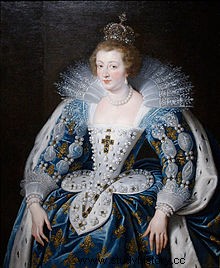
Born in Valladolid in 1601 - Died in Paris in 1666.
Queen of France. Daughter of Philip III of Spain and Margaret of Austria, she received, in Habsburg fashion, more education than instruction when she was married, aged fourteen, to Louis XIII, her junior by five. days.
Justified by the needs of the policy of Franco-Spanish rapprochement of Marie de Medici, this union did not initially produce all the expected fruits. Although hostilities did not officially resume until 1635, the king showed little eagerness towards a person who nevertheless passed for well done, and to this apparent disdain, or at least this lack of attention, Anne responded by manifesting increasingly ardent Spanish sentiments as the threat of war became clearer.
All his behavior arouses the mistrust of a naturally suspicious husband. It was first of all the Buckingham affair, in 1625, the danger of which she understood in time, helped by her sense of Spanish honor. It is then the plot of Chalais, in 1626, in which she is involved as in all the clumsy intrigues in which Madame de Chevreuse manages to engage her; she thus made herself a vigilant enemy of Richelieu, who spied on her with regularity and who seemed to have served her for a long time in the mind of the king. From a psychological and moral point of view, the deterioration of marital relations reached its peak with the discovery, in 1637, of the secret correspondence she had with the King of Spain Philip IV and the Cardinal-Infant. Although it is generally admitted that she was then on the brink of her loss, it is not certain that she thus delivered to her brothers information of primary importance. Be that as it may, the disgrace is very brief. In 1638, the dauphin so awaited by all French people (except Gaston d'Orléans) was born.
It is no longer possible to repudiate the mother of the future king. The queen has become indispensable, not only to the king, but also to the policy of his minister. In 1642, she would have won the good graces of Richelieu by revealing to him the secrets of the Cinq-Mars* plot. Was the queen well involved in the plot? Nothing can confirm it. The death of Louis XIII, in 1643, is another great date in the life of Anne of Austria. The regency had barely opened when the queen had her husband's will annulled. She now has all the powers, in particular that of entrusting the affairs of the kingdom to whomever she pleases. She had the good taste to appoint Mazarin head of her council. Those who counted on the regency to overturn the order desired by Richelieu and conquer the good places must be disillusioned. The Important, the ambitious or the simply embittered are crying out for Mazarin's dismissal. This is to underestimate the character of the sovereign. Convinced that her authority was at stake, Anne of Austria began by confirming the functions of Mazarin, whose power would be as unlimited as that of Richelieu. And immediately after, she strikes a blow by sending back to prison the craziest of the Importants, Beaufort, who is not yet the hero of the populace. It does not take more to silence, for a few years, the inclinations of opposition. It is difficult to assess independently the political action of the queen and that of her minister during the period of the Fronde from 1648 to 1653, and more generally during the eighteen years which separate the reign of Louis XIII and the personal reign. of Louis XIV from 1661 to 1715.
From the beginning of the regency, the Court, struck by the unity of inspiration which presides over the destinies of the kingdom, had concluded that the widow of Louis XIII had found in the cardinal a lover who consoled her for her past setbacks. Without it being possible to deny Anne's inclination for her favourite, and the influence of this feeling on French politics, one should not reason as an author of mazarinades and make the queen a plaything in the hands of an Italian schemer. The authoritarian acts of the regency were decided jointly by her and Mazarin. When circumstances made it necessary to revoke them (the typical case of the arrest of Broussel), the queen always put up more resistance than her minister. Conversely, the conciliatory acts were almost all initiated or inspired by Mazarin. The association of a Spaniard and an Italian allowed the definitive conclusion of the treaties of Westphalia in 1648, the lowering of the nobles who had mistakenly believed that they had returned to the good times of the regency of Marie de Medici, the annihilation of the political pretensions of the Parliament of Paris, the negotiation and conclusion of the Treaty of the Pyrenees in 1659 (with the marriage of Louis XIV and Marie-Thérèse, which had long been the great personal design of the Queen). This is not all that Louis XIV owes his mother. It seems that it bequeathed much of its dignity and natural majesty.
By his will, the king receives an instruction, perhaps not very extensive, but solid and practical, made up of simple principles, freed from fashionable prejudices.
After the death of Mazarin, Anne no longer has any part in the government of the kingdom. Nevertheless, she continued to enjoy her son's deference and affection.
She gave Louis XIII two sons who are the ancestors of all the Bourbons who reigned in Europe after the 17th century.
Her secret marriage to Mazarin has never been proven.
